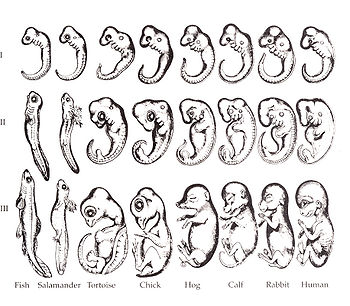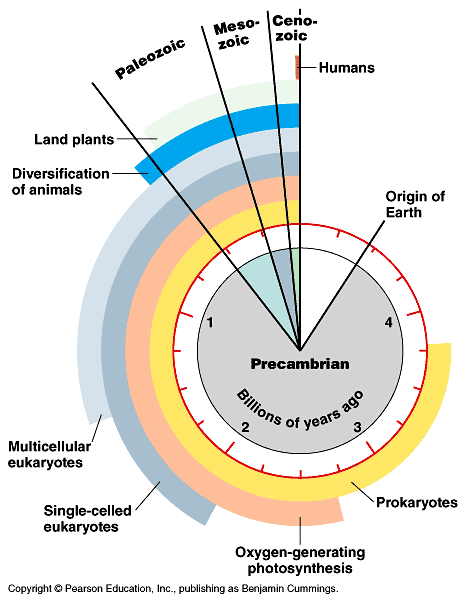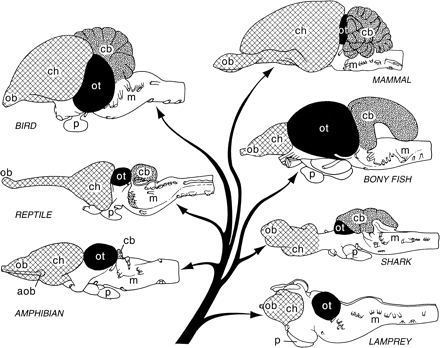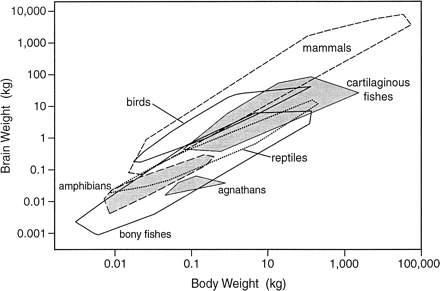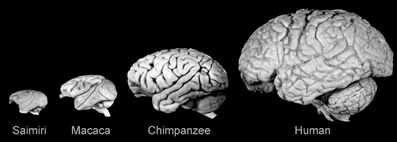Prelude
Prelude
Today's Topics
- No class on Friday.
- Wrap-up on hormonal communication
- The evolution and development of the nervous system
Which of these hormones is released directly into the bloodstream by the brain?
- Oxytocin
- Vasopressin
- Cortisol
- Adrenocorticotropic hormone
Which of these hormones is released directly into the bloodstream by the brain?
- Oxytocin
- Vasopressin
- Cortisol
- Adrenocorticotropic hormone
Where are they released?
- Oxytocin (anterior pituitary/posterior pituitary)
- Vasopressin (anterior pituitary/posterior pituitary)
- Adrenocorticotropic hormone (anterior pituitary/posterior pituitary)
Where are they released?
- Oxytocin (anterior pituitary/posterior pituitary)
- Vasopressin (anterior pituitary/posterior pituitary)
- Adrenocorticotropic hormone (anterior pituitary/posterior pituitary)
Public acceptance of evolution
Types of evidence
- Fossil
- Fossil dating
- Geological
- Where fossils are found relative to one another
- How long it takes to form layers
- Genetic
- Rates of mutation
- Anatomical
Dobzhansky
Nothing in Biology Makes Sense Except in the Light of Evolution
"Seen in the light of evolution, biology is, perhaps, intellectually the most satisfying and inspiring science. Without that light, it becomes a pile of sundry facts some of them interesting or curious, but making no meaningful picture as a whole."
Why is the theory so controversial (in the U.S.)?
Why Gilmore thinks it's controversial (in the U.S.)
- Contradicts verbatim/non-metaphorical reading of some religious texts
- Makes humans seem less special
- Time scales involved beyond human experience
- Scientific method vs. other ways of knowing
- Found in nature ≠ good for human society
Why Gilmore thinks it's controversial (in the U.S.)
- Few negative consequences of 'disbelief'
- U.S. culture individualistic, skeptical, anti-elitist/anti-intellectual
- Lower levels of religious belief among U.S. scientists
- Politics
- A minority of citizens support teaching evolution-only
- Majority of classroom teachers aren't strong advocates
Ontogenesis and phylogenesis
- Ontogenesis
- Development within lifetimes, history of individuals
- Phylogenesis
- Change across lifestimes, history of species
Ontogeny does not recapitulate phylogeny (Haeckel), but…
Complex multicellular life emerged "recently"
Time scales
Nervous system architectures

An animal with a nerve "net"
How nervous systems differ
- Body symmetry
- radial
- bilateral
- Segmentation
- Cephalization (concentration of sensory & neural structures in anterior portion of body)
- Encasement in bone (vertebrates)
- Centralized vs. distributed function
Cephalopods have "intelligent arms"
Biological imperatives
- Ingestion
- Defense
- Reproduction
Information processing schematic
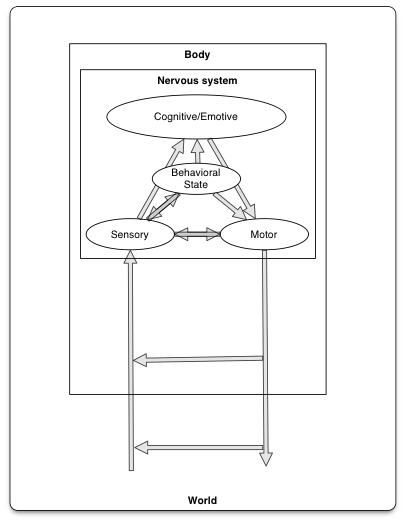
Information processing universals
- Sense/detect
- Sensors
- Analyze, evaluate, decide
- Act
- Effectors
- e.g., approach/avoid, manipulate, ingest, signal
Sensors
- Specialize by information source/type
- Specialize by target location
- Interoceptive
- Exteroceptive
Analysis, evaluation, decision
- Current state
- World
- Organism
- Current goals
- Past state(s)
Effectors
- Move body
- Send signals
- Change physiological state
From nerve net to nerve ring, nerve cord and brain — evolution of the nervous system
(Arendt et al., 2016)
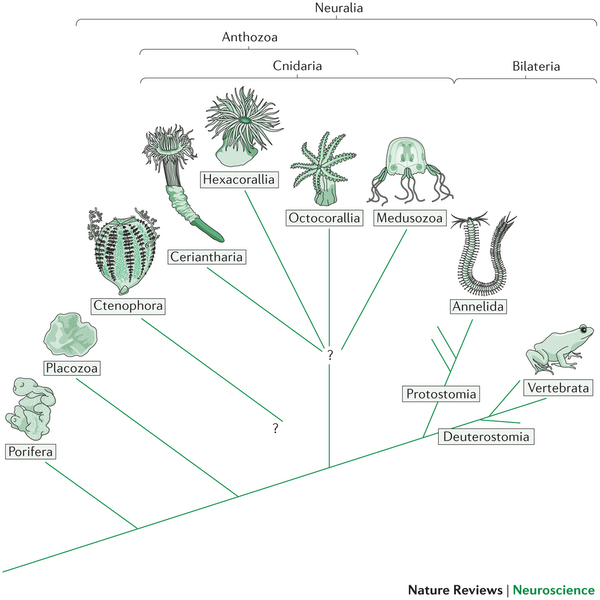
(Arendt et al., 2016)
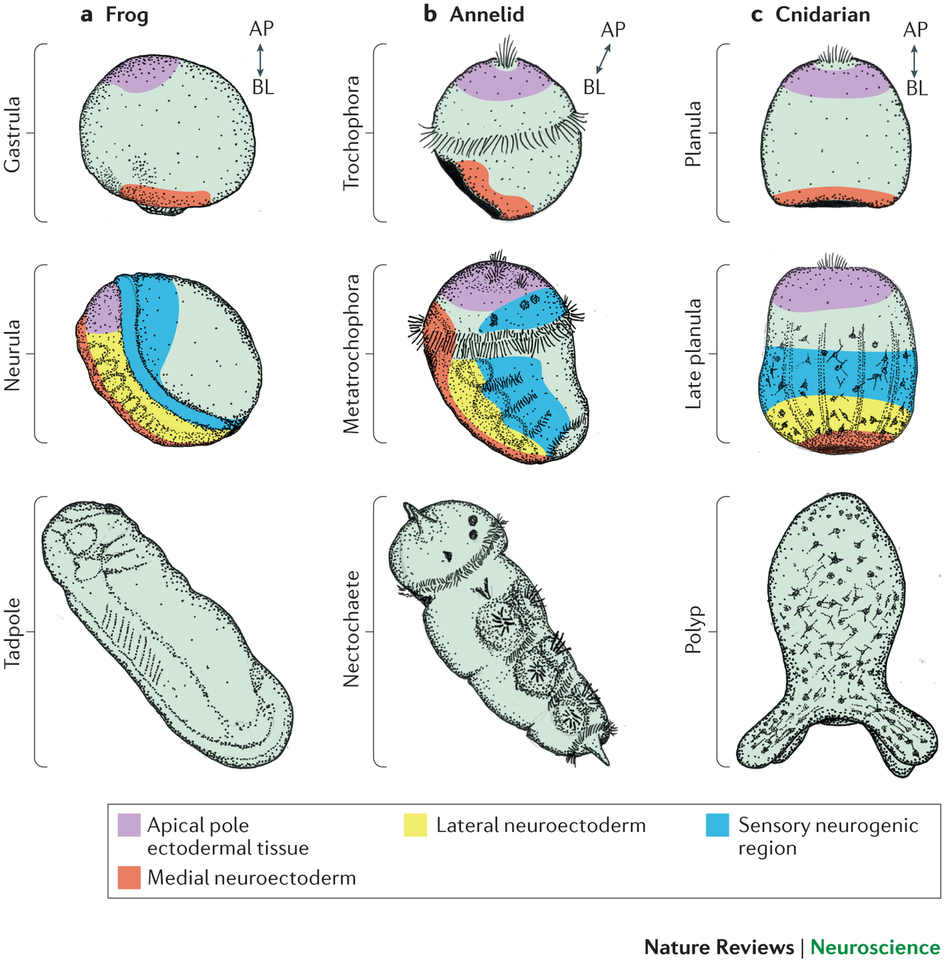
Take homes
- Neurons and nervous systems 520-570 M years old
- Similarities at molecular level in how diverse nervous systems develop
Similarities in overall vertebrate CNS organization

Variation in overall brain mass/body mass
Evolutionary trends in cortical size
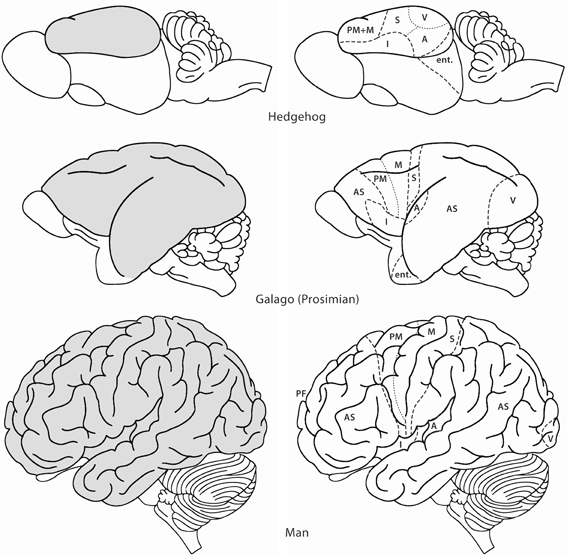
(Hofman, 2014)
Evolutionary trends in cortical size
| Structural measure | Non-human comparison | Human |
|---|---|---|
| Cortical gray matter %/tot brain vol | insectivores 25% | 50% |
| Cortical gray + white | mice 40% | 80% |
| Cerebellar mass | primates, mammals 10-15% | 10-15% |
Evolutionary trends in cortical size
Evolutionary trends in primate brain size
Take homes
- Brain sizes scale with body size
- Brain sizes scale with animal class (more or less)
Old story
- Within mammals, human brains bigger than expected
- Higher encephalization quotient
- Humans have larger cerebral cortical gray + white matter than comparable mammals
New story
- Does brain size/mass matter (that much)?
- "Size matters" (brain mass) presumes similarity among brains at micro-level
- Big (large mass) brains arise in multiple animal lineages
New story
- # of cortical neurons more important difference than brain mass
- The primate advantage -> more cortical neurons, but not larger neurons
- Human brain just scaled up (non-ape) primate brain
# of cortical (or in birds, pallidum) neurons predicts "cognition"?
The Human Advantage (Herculano-Houzel, 2016)
- More neurons in cerebral cortex than other animals, but not disproportionately so
- Less time spent foraging
- Higher quality/more energetically dense food
- Higher food availability
- Cultural factors (agriculture + cooking)
- See also (Wrangham, 2009)
A further human advantage
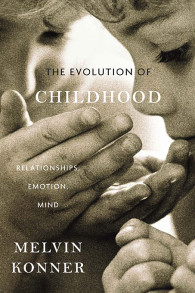
Next time…
- Wrap-up on brain development
References
Arendt, D., Tosches, M. A., & Marlow, H. (2016). From nerve net to nerve ring, nerve cord and brain — evolution of the nervous system. Nature Reviews Neuroscience, 17(1), 61–72. https://doi.org/10.1038/nrn.2015.15
Dobzhansky, T. (1973). Nothing in biology makes sense except in the light of evolution. The American Biology Teacher, 35(3), pp. 125–129. Retrieved from http://www.jstor.org/stable/4444260
Herculano-Houzel, S. (2016). The human advantage: A new understanding of how our brain became remarkable. MIT Press. Retrieved from https://market.android.com/details?id=book-DMqpCwAAQBAJ
Herculano-Houzel, S. (2017). Numbers of neurons as biological correlates of cognitive capability. Current Opinion in Behavioral Sciences, 16(Supplement C), 1–7. https://doi.org/10.1016/j.cobeha.2017.02.004
Hofman, M. A. (2014). Evolution of the human brain: When bigger is better. Frontiers in Neuroanatomy, 8. https://doi.org/10.3389/fnana.2014.00015
Miller, J. D., Scott, E. C., & Okamoto, S. (2006). Public acceptance of evolution. SCIENCE-NEW YORK THEN WASHINGTON-, 313(5788), 765. https://doi.org/10.1126/science.1126746
Northcutt, R. G. (2002). Understanding vertebrate brain evolution. Integr. Comp. Biol., 42(4), 743–756. https://doi.org/10.1093/icb/42.4.743
Rakic, P. (2009). Evolution of the neocortex: A perspective from developmental biology. Nature Reviews Neuroscience, 10(10), 724–735.
Wrangham, R. (2009). Catching fire: How cooking made us human. Basic Books. Retrieved from https://market.android.com/details?id=book-ebEOupKz-rMC

